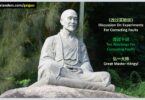[1]
丛林以无事为兴盛。
[In] monasteries, [it is] without matters
[of contention, confusion and complication]
as [spiritual] prosperity.
[2]
修行以念佛为稳当。
[For] cultivation [of] practice,
[it is] with mindfulness [of] Buddha as [the most] reliable,
[as it is the easiest, safest and swiftest
for the greatest results].
[3]
精进以持戒为第一。
Diligence [is] with
upholding [of] precepts as [the] foremost.
[4]
疾病以减食为汤药。
Sickness [is] with
reduction [of] eating as medicine
[or decoction].
[5]
烦恼以忍辱为菩提。
Afflictions [are] with
patience as Bodhi
[i.e. awakening].
[6]
是非以不辩为解脱。
Quarrels [over right and wrong are] with
not arguing as liberation.
[7]
留众以老成为真情。
Retaining [of] assemblies [is] with
experienced [practitioners] as true sincerity.
[8]
执事以尽心为有功。
Handling [of] duties [is] with
all [of one’s] heart as having merits.
[9]
语言以减少为直截。
Spoken words [are] with
reduction as straightforwardness.
[10]
长幼以慈和为进德。
[The] elderly [and] young [are] with
kindness [and] harmony as
diligent [development of] virtues.
[11]
学问以勤习为入门。
Learning [or ‘asking for knowledge’ is] with
diligent practice as [the] entry gate.
[12]
因果以明白为无过。
[Karmic] causes [and] effects [are] with
understanding [them] as without transgressions.
[13]
老死以无常为警策。
Ageing [and] death [are] with
impermanence as admonition.
[14]
佛事以精严为切实。
Buddhist ceremonies [are] with
strict meticulousness as practical [workablity].
[15]
待客以至诚为供养。
Receiving [of] guests [is] with
utmost sincerity as making [of] offerings.
[16]
山门以耆旧为庄严。
Mountain gates [are] with
elderly [and] respected [practitioners] as adornment.
[17]
凡事以预立为不劳。
All matters [are] with
[advanced] preparation established as without toil.
[18]
处众以谦恭为有礼。
Getting along [with] assemblies [is] with
humility [and] reverence as having courtesy.
[19]
遇险以不乱为定力。
Encountering dangers [is] with
not [being] scatter-minded as power [of] concentration.
[20]
济物以慈悲为根本。
Helping sentient beings [is] with
loving-kindness [and] compassion as [fundamental] root.





